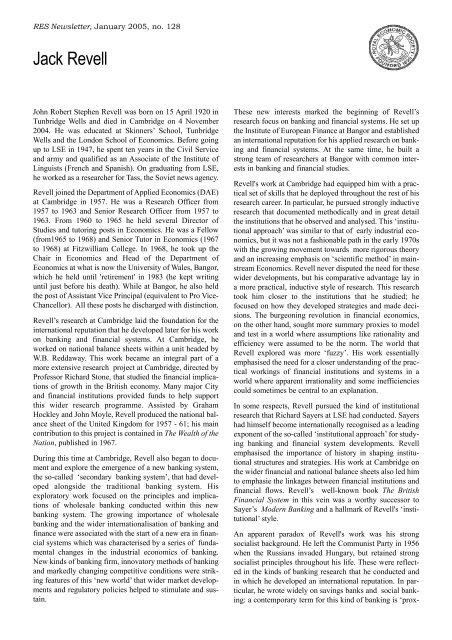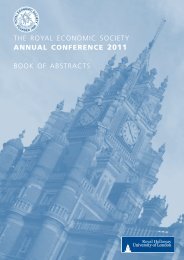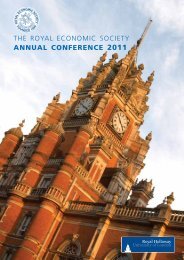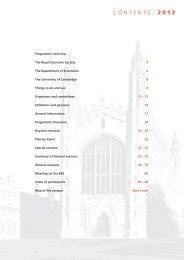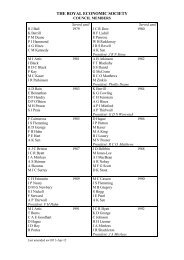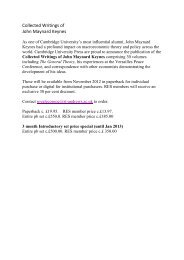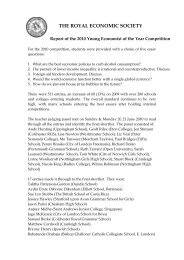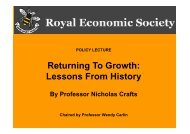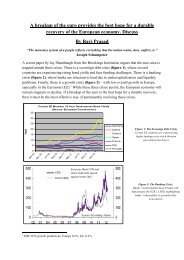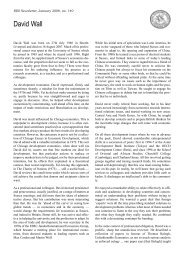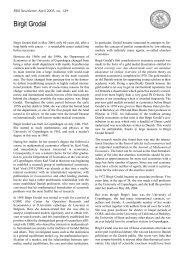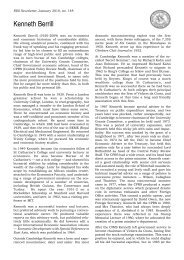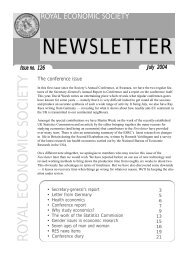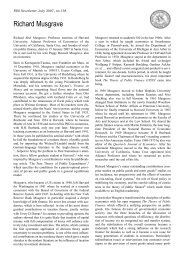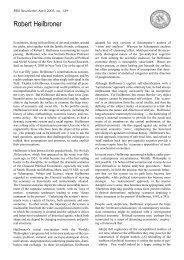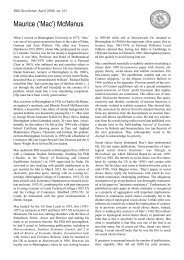Jack Revell - Royal Economic Society
Jack Revell - Royal Economic Society
Jack Revell - Royal Economic Society
You also want an ePaper? Increase the reach of your titles
YUMPU automatically turns print PDFs into web optimized ePapers that Google loves.
RES Newsletter, January 2005, no. 128<br />
<strong>Jack</strong> <strong>Revell</strong><br />
John Robert Stephen <strong>Revell</strong> was born on 15 April 1920 in<br />
Tunbridge Wells and died in Cambridge on 4 November<br />
2004. He was educated at Skinners’ School, Tunbridge<br />
Wells and the London School of <strong>Economic</strong>s. Before going<br />
up to LSE in 1947, he spent ten years in the Civil Service<br />
and army and qualified as an Associate of the Institute of<br />
Linguists (French and Spanish). On graduating from LSE,<br />
he worked as a researcher for Tass, the Soviet news agency.<br />
<strong>Revell</strong> joined the Department of Applied <strong>Economic</strong>s (DAE)<br />
at Cambridge in 1957. He was a Research Officer from<br />
1957 to 1963 and Senior Research Officer from 1957 to<br />
1963. From 1960 to 1965 he held several Director of<br />
Studies and tutoring posts in <strong>Economic</strong>s. He was a Fellow<br />
(from1965 to 1968) and Senior Tutor in <strong>Economic</strong>s (1967<br />
to 1968) at Fitzwilliam College. In 1968, he took up the<br />
Chair in <strong>Economic</strong>s and Head of the Department of<br />
<strong>Economic</strong>s at what is now the University of Wales, Bangor,<br />
which he held until 'retirement' in 1983 (he kept writing<br />
until just before his death). While at Bangor, he also held<br />
the post of Assistant Vice Principal (equivalent to Pro Vice-<br />
Chancellor). All these posts he discharged with distinction.<br />
<strong>Revell</strong>’s research at Cambridge laid the foundation for the<br />
international reputation that he developed later for his work<br />
on banking and financial systems. At Cambridge, he<br />
worked on national balance sheets within a unit headed by<br />
W.B. Reddaway. This work became an integral part of a<br />
more extensive research project at Cambridge, directed by<br />
Professor Richard Stone, that studied the financial implications<br />
of growth in the British economy. Many major City<br />
and financial institutions provided funds to help support<br />
this wider research programme. Assisted by Graham<br />
Hockley and John Moyle, <strong>Revell</strong> produced the national balance<br />
sheet of the United Kingdom for 1957 - 61; his main<br />
contribution to this project is contained in The Wealth of the<br />
Nation, published in 1967.<br />
During this time at Cambridge, <strong>Revell</strong> also began to document<br />
and explore the emergence of a new banking system,<br />
the so-called ‘secondary banking system’, that had developed<br />
alongside the traditional banking system. His<br />
exploratory work focused on the principles and implications<br />
of wholesale banking conducted within this new<br />
banking system. The growing importance of wholesale<br />
banking and the wider internationalisation of banking and<br />
finance were associated with the start of a new era in financial<br />
systems which was characterised by a series of fundamental<br />
changes in the industrial economics of banking.<br />
New kinds of banking firm, innovatory methods of banking<br />
and markedly changing competitive conditions were striking<br />
features of this ‘new world’ that wider market developments<br />
and regulatory policies helped to stimulate and sustain.<br />
These new interests marked the beginning of <strong>Revell</strong>’s<br />
research focus on banking and financial systems. He set up<br />
the Institute of European Finance at Bangor and established<br />
an international reputation for his applied research on banking<br />
and financial systems. At the same time, he built a<br />
strong team of researchers at Bangor with common interests<br />
in banking and financial studies.<br />
<strong>Revell</strong>'s work at Cambridge had equipped him with a practical<br />
set of skills that he deployed throughout the rest of his<br />
research career. In particular, he pursued strongly inductive<br />
research that documented methodically and in great detail<br />
the institutions that he observed and analysed. This ‘institutional<br />
approach’ was similar to that of early industrial economics,<br />
but it was not a fashionable path in the early 1970s<br />
with the growing movement towards more rigorous theory<br />
and an increasing emphasis on ‘scientific method’ in mainstream<br />
<strong>Economic</strong>s. <strong>Revell</strong> never disputed the need for these<br />
wider developments, but his comparative advantage lay in<br />
a more practical, inductive style of research. This research<br />
took him closer to the institutions that he studied; he<br />
focused on how they developed strategies and made decisions.<br />
The burgeoning revolution in financial economics,<br />
on the other hand, sought more summary proxies to model<br />
and test in a world where assumptions like rationality and<br />
efficiency were assumed to be the norm. The world that<br />
<strong>Revell</strong> explored was more ‘fuzzy’. His work essentially<br />
emphasised the need for a closer understanding of the practical<br />
workings of financial institutions and systems in a<br />
world where apparent irrationality and some inefficiencies<br />
could sometimes be central to an explanation.<br />
In some respects, <strong>Revell</strong> pursued the kind of institutional<br />
research that Richard Sayers at LSE had conducted. Sayers<br />
had himself become internationally recognised as a leading<br />
exponent of the so-called ‘institutional approach’ for studying<br />
banking and financial system developments. <strong>Revell</strong><br />
emphasised the importance of history in shaping institutional<br />
structures and strategies. His work at Cambridge on<br />
the wider financial and national balance sheets also led him<br />
to emphasie the linkages between financial institutions and<br />
financial flows. <strong>Revell</strong>’s well-known book The British<br />
Financial System in this vein was a worthy successor to<br />
Sayer’s Modern Banking and a hallmark of <strong>Revell</strong>'s ‘institutional’<br />
style.<br />
An apparent paradox of <strong>Revell</strong>'s work was his strong<br />
socialist background. He left the Communist Party in 1956<br />
when the Russians invaded Hungary, but retained strong<br />
socialist principles throughout his life. These were reflected<br />
in the kinds of banking research that he conducted and<br />
in which he developed an international reputation. In particular,<br />
he wrote widely on savings banks and social banking:<br />
a contemporary term for this kind of banking is ‘prox-
imity banking’ (where bank physical presence is directed<br />
towards serving all local and regional demands and providing<br />
a vehicle for lessening asymmetric information problems,<br />
which are particularly attenuated for less profitable<br />
customer groups).<br />
<strong>Revell</strong> was concerned that a free enterprise banking system<br />
driven solely by the profit motive could lead to some segments<br />
of society being increasingly excluded from financial<br />
services. Today these concerns are echoed in the growing<br />
policy concern with the problems of ‘financial exclusion’,<br />
now recognised as a key issue in attacking wider social<br />
exclusion problems. Many students believe in a need to reinvent<br />
proximity banking in order to help solve these problems,<br />
an approach long advocated by <strong>Revell</strong>.<br />
<strong>Revell</strong>’s kind of practical, inductive research also helped<br />
him to understand the forces that were shaping the industry<br />
so that he was able to 'look ahead' ahead and make some<br />
informed proposals. His work on proximity banking and<br />
the related issues of financial exclusion are an example.<br />
<strong>Revell</strong> was also one of the first UK researchers to identify<br />
the need for bank prudential regulation (or supervision) as<br />
a necessary condition to capture and sustain the economic<br />
benefits of contemporaneous liberalisation and deregulation<br />
(of banking structure and conduct rules). This need and<br />
respective policy balance have emerged as one of the big<br />
policy challenges of the modern era of banking and financial<br />
system development.<br />
In the area of banking supervision, <strong>Revell</strong> was one of the<br />
first to study the importance of bank capital adequacy and<br />
the special problems of handling uncertainty associated<br />
with capital adequacy tests: he advocated the use of the<br />
technique of stress testing in this domain. He also suggested<br />
that banking supervisors should ‘vicariously participate’<br />
in bank management in order to lessen the potential of ‘regulatory<br />
arbitrage’ (where banks attempt to innovate around<br />
restrictive regulations). Supervision and capital adequacy<br />
are now major drivers of the global banking industry. The<br />
much debated, new ‘Basel 2’ global standards for banks<br />
come into effect in 2007 and they include stress testing for<br />
capital adequacy and an emphasis by regulators on ‘economic<br />
capital’, the quantum of capital that an efficiently<br />
run bank, subject to the discipline of a well-informed market,<br />
should hold. These kinds of techniques and regulatory<br />
principles were first discussed and explored by <strong>Revell</strong> in<br />
his research monographs during the early 1970s when<br />
such issues were seen as somewhat quirky (at best) by<br />
mainstream UK monetary economists.<br />
Many of <strong>Revell</strong>’s research interests in institutional developments<br />
and related policy questions were shared by<br />
Continental European Economists, especially in countries<br />
like Italy and Spain. He was the leading light and founding<br />
father of the Wolpertinger Club of banking professors with<br />
a common interest in such research. This club (now over 70<br />
strong and over 20 years old) meets once a year to conduct<br />
a two day research seminar on banking and financial issues.<br />
He leaves a wife, Pat, and three children, Barbara, Alison<br />
and David.<br />
E P M Gardener<br />
University of Wales, Bangor


